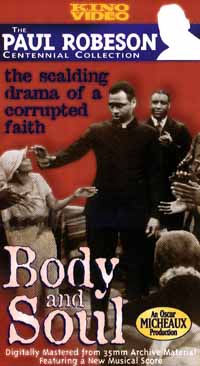


video series review by Chris Norton |
|
The film is notorious for a number of reasons and fell afoul of the New York Board of Censorship, which forced Micheaux to re-edit the film at least once. Remarkably it retained pieces of partial nudity, drunkenness, thievery and disturbing images of two rapes by the nefarious Right Reverend Isaiah T. Jenkins (the first of the Robeson characters in the film). Jenkins is an escaped criminal who has set himself up as a respectable preacher, preying on the good will of his congregation while he frequents speak-easies and gambling establishments. In fact, Jenkins even takes kick-backs from the speak-easy proprietor so as not to preach against the evils of drink and gambling on Sundays. Meanwhile, we meet Isabelle, a young woman in town who wants to marry Sylvester, the Reverend's good twin brother, also played by Robeson. The couple ask Isabelle's mother for permission to get married, but Martha will not allow it because she hopes her daughter will marry the "respected" Reverend instead. Martha plans to get Isabelle and the Reverend together alone despite Isabelle's warnings that he is a drunk and a liar. Under the cover of preaching the evil out of Isabelle, the Reverend is left alone with Isabelle. He immediately pounces on her. An inter-title reads "Later" as a close-up of the Reverend's smiling face appears. We are left with little doubt that he has just raped her. When Martha returns home, she finds Isabelle in great despair. The Reverend tells Martha that her daughter is distraught over having the evil driven from her. In one of the most notorious lines in the film, the Reverend says, "It was a great struggle, Sister Martha; but the Lord's will be done." It was this portrayal of a "man of God" that caused at least one black church to condemn the film. Isabelle is so distraught that she catches a train for Atlanta and leaves a letter for her mother, informing her that she took their life savings. Martha spends several months tracking down her daughter and finds her living a destitute life in Atlanta. On her deathbed, Isabelle convinces her mother about the real Reverend in a series of complicated flashbacks. These scenes are remarkably graphic as Robeson plays an almost possessed villain to high melodramatic effect. While Body and Soul is melodramatic in the vein of all great silent films, other facets of the production make this film an incredible feature. It features an all-black cast with Robeson triumphing in his two roles. The "Dry Bones in the Valley" sermon finds Robeson giving perhaps his most energetic and magnetic performance. Micheaux has sprinkled the film with scenes that scorch the memory. The rape during a rainstorm is perhaps too graphic for even a modern film and the city scenes of Atlanta call to mind many of the "City-Symphony" avant-garde films of the era. This film, long ignored by film critics, now can be seen in a wonderfully restored version. While it may not possess the refinement that Robeson's characters would display in later films, it is well worth viewing to experience what one of the greatest black actors and black directors teamed up to give us.
|
 Body and Soul is only disappointing in that we cannot hear Paul Robeson's wonderful baritone. However, Robeson loses none of his screen presence as we are given two Paul Robesons to admire (or in one of the cases, despise). Robeson plays evil twin brothers in this, his screen debut by famed black independent director Oscar Micheaux. Micheaux has seen a great revival in recent years, as many of his films feared lost have been restored and re-released with film history being re-written to account for the presence of a successful and somewhat prolific black director. This film is arguably most emblematic of Micheaux's known work and serves as a great example of black independent film.
Body and Soul is only disappointing in that we cannot hear Paul Robeson's wonderful baritone. However, Robeson loses none of his screen presence as we are given two Paul Robesons to admire (or in one of the cases, despise). Robeson plays evil twin brothers in this, his screen debut by famed black independent director Oscar Micheaux. Micheaux has seen a great revival in recent years, as many of his films feared lost have been restored and re-released with film history being re-written to account for the presence of a successful and somewhat prolific black director. This film is arguably most emblematic of Micheaux's known work and serves as a great example of black independent film.